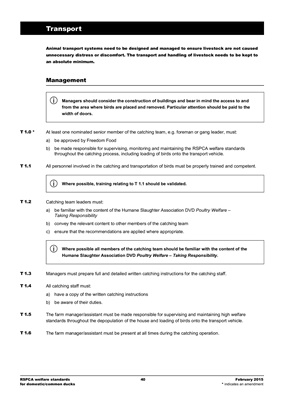
RSPCA welfare standards
for domestic/common ducks
40 February 2015
* indicates an amendment
Transport
Animal transport systems need to be designed and managed to ensure livestock are not caused
unnecessary distress or discomfort. The transport and handling of livestock needs to be kept to
an absolute minimum.
Management
Managers should consider the construction of buildings and bear in mind the access to and
from the area where birds are placed and removed. Particular attention should be paid to the
width of doors.
T 1.0 * At least one nominated senior member of the catching team, e.g. foreman or gang leader, must:
a) be approved by Freedom Food
b) be made responsible for supervising, monitoring and maintaining the RSPCA welfare standards
throughout the catching process, including loading of birds onto the transport vehicle.
T 1.1 All personnel involved in the catching and transportation of birds must be properly trained and competent.
Where possible, training relating to T 1.1 should be validated.
T 1.2 Catching team leaders must:
a) be familiar with the content of the Humane Slaughter Association DVD Poultry Welfare -
Taking Responsibility
b) convey the relevant content to other members of the catching team
c) ensure that the recommendations are applied where appropriate.
Where possible all members of the catching team should be familiar with the content of the
Humane Slaughter Association DVD Poultry Welfare - Taking Responsibility.
T 1.3 Managers must prepare full and detailed written catching instructions for the catching staff.
T 1.4 All catching staff must:
a) have a copy of the written catching instructions
b) be aware of their duties.
T 1.5 The farm manager/assistant must be made responsible for supervising and maintaining high welfare
standards throughout the depopulation of the house and loading of birds onto the transport vehicle.
T 1.6 The farm manager/assistant must be present at all times during the catching operation.